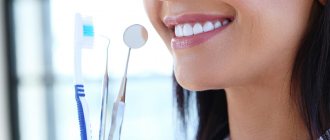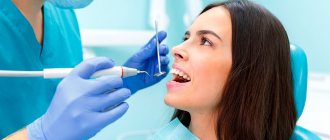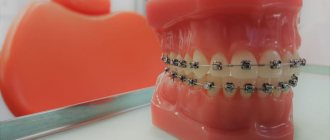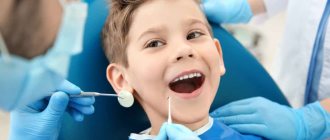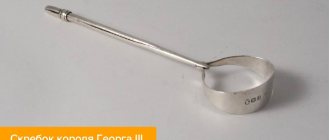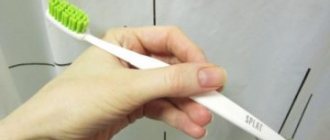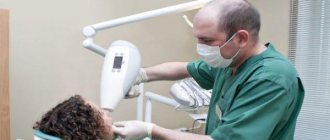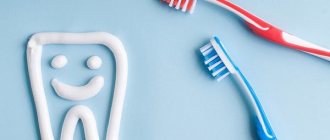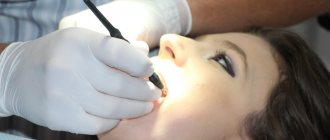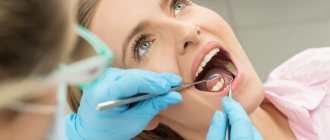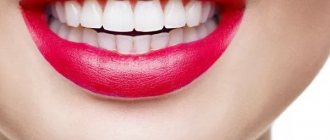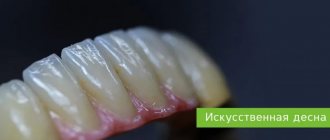The overwhelming number of oral diseases is associated with the activity of pathogenic bacteria. The plaque that forms in the mouth contains food debris and dead particles of the epithelium. Even with regular hygiene and care, the oral cavity still contains pathogenic microorganisms and their waste products. Bacterial plaque is the main cause of the development of caries and periodontal disease. It is impossible to completely get rid of plaque in the mouth and prevent the growth of bacteria at home: it is quite difficult to clean the interdental spaces and deep fissures with a regular brush. Accumulated deposits can be removed using professional oral hygiene.
Why is professional hygiene necessary?
“I brush my teeth twice a day for three minutes, use dental floss and mouthwash. Why spend money on dental cleanings? - this is a question many people ask. However, home hygiene alone, even the most thorough, is almost never enough. A toothbrush is simply not able to reach all hard-to-reach places, and it is not able to cope with hard deposits - tartar. Tartar is bacterial plaque hardened by salts.
Solid deposits have a yellow-brown tint. Over time, they become noticeable not only on the back surface of the teeth, but also in the spaces between teeth when a person speaks and smiles. Tartar causes bad breath and leads to inflammation in the gums.
PROFESSIONAL CLEANING
• Removes soft and hard plaque. • Disinfects the dental cavity. • Makes teeth a little whiter. • Freshens breath. • Strengthens tooth enamel. • Prevents the development of caries and other diseases.
Features of the procedure
Procedures are carried out using special tools and devices. These are professional toothbrushes of varying hardness, abrasives, ultrasound and combined equipment, irrigators, therapeutic ointments. After professional oral hygiene, the doctor gives recommendations for cleaning your teeth and gums at home.
Professional oral hygiene in a clinical setting has a number of advantages:
- the ability to remove all deposits, including in hard-to-reach places;
- the ability to restore the natural shade of enamel without special bleaching;
- absolute safety;
- absence of discomfort and pain during professional hygiene.
Professional hygiene is an excellent prevention of periodontal diseases, since during the procedures, tooth enamel is enriched with the necessary mineral components. It is also worth noting that after removing deposits, carious lesions become clearly visible, which allows them to be healed in a timely manner. Grinding and polishing, used during professional manipulations, makes it possible to restore the shade of the enamel, which is especially important for prosthetics.
Sometimes after medical procedures in professional hygiene, tooth sensitivity may increase. Special remedies prescribed by the dentist help get rid of discomfort. These can be toothpastes, rinses, gels.
Oral hygiene has its contraindications:
- viral and infectious diseases (hepatitis, HIV);
- respiratory diseases;
- bleeding disorders and circulatory system diseases;
- dental diseases in the acute stage;
- injuries and wounds in the oral cavity.
Contraindications to oral hygiene are: exacerbation of certain chronic diseases, the presence of a pacemaker in the patient, childhood (up to 14 years).
How is the cleaning done?
Previously, dental plaque was removed manually using mechanical instruments, but this was uncomfortable for the patient and harmful to the enamel.
Today, hygienists use ultrasound and Air Flow devices.
- Tartar is removed using an ultrasonic scaler.
- An abrasive solution under high pressure removes soft bacterial plaque, traces of coffee, nicotine, and food coloring.
- Tooth enamel is polished and fluoridated to strengthen it.
BEFORE WHAT TREATMENT SHOULD YOU CLEANSE?
• Implantation • Prosthetics • Installation of braces • Installation of veneers • Whitening • Dental treatment (in some cases)
Ultraviolet teeth whitening
At the Ilatan dental clinic, you also have the opportunity to replace the ultrasound procedure with an ultraviolet one. The big advantage of the latter is that it does not cause any discomfort, is safe and easy. The disadvantage is that it is not available to everyone, because it is quite expensive, but high quality and reliability are guaranteed.
Teeth whiteness can be maintained with proper care for up to five years, that is, it is enough to replace the ultrasonic procedure with an ultraviolet one every few years and your teeth will be in perfect condition. Professional whitening is carried out using the Zoom 3 system, which makes the procedure completely safe and even enjoyable. It involves applying a special gel to the surface of the teeth, which, under the influence of ultraviolet radiation, begins to act and discolor the teeth. It is completely safe for the gums and oral mucosa.
It is worth remembering that even snow-white teeth are susceptible to the formation of plaque and tartar, which means that procedures should not be completely ruled out. Cleaning the surface of teeth with ultraviolet light is professional teeth whitening.
The price is, of course, high, but the Ilatan dental clinic offers a variety of discounts and much more. A huge advantage of ultraviolet cleaning is that it greatly brightens teeth in a short period of time and has no contraindications. But you should only go to a qualified specialist for such a procedure, so a dental clinic is an ideal option.
Innovative new product!
The Swiss company EMS has released a new generation device, Air Flow Prophylaxis Master. He brought professional hygiene to an even higher level: ultrasonic cleaning became available to those with very sensitive enamel and patients with periodontitis. The new device is equipped with a nozzle for removing deposits under the gum - previously this procedure was not included in the standard list of professional hygiene procedures.
HOW OFTEN DO I CLEAN?
• Adults - once every 6-12 months. • Children with mixed dentition - every 3 months. • For those who wear braces - at intervals of 2-4 months. • For older people with dentures - every 4-5 months.
Advantages of visiting the Medikastom clinic
Doctors at the Medikastom clinic are ready to perform professional manipulations to help you achieve a beautiful smile and minimize the risk of developing dental diseases. We have everything necessary to perform the procedures; professional hygiene is carried out by experienced and qualified specialists. Detailed information on hygiene issues and prices for services can be obtained from representatives of the clinic by contacting them by phone.
Vector Paro device
Another progressive technology in the field of dental hygiene belongs to the German company Durr Dental. The Vector Paro ultrasound device is designed to remove dental plaque under the gum, as well as for the prevention and treatment of periodontitis. Unlike conventional scalers, the tip oscillates here not horizontally, but vertically. Due to this, the risk of damage to the root surface is reduced to zero. The device does not use ordinary distilled water, but a mineral solution, which helps reduce tooth sensitivity after ultrasonic cleaning.
Regularity of the procedure
You should visit your hygienist regularly to maintain healthy gums and teeth. The frequency of visits is determined by the dentist based on the clinical situation. Usually once every six months is enough.
For those patients who wear braces, visits every 3 months are recommended, since careful home hygiene is impossible during orthodontic treatment. The arch and the locking mount interfere with cleaning the dental spaces.
For those who enjoy coffee, strong tea and/or smoke, 3-4 times a year. Bad habits negatively affect the oral cavity, plaque and stones form faster.
It is also important to undergo preventive hygiene before and during pregnancy. A pregnant woman's gums are subject to hormonal changes, so it is important that there is no infection in the oral cavity. Therefore, all teeth must be healthy, there must be no stones or plaque in the mouth.
Mechanical cleaning
Of course, doctors no longer use sharp instruments to chip away plaque. Manual cleaning is performed with brushes and abrasive pastes - the dentist cleans the surface of remaining plaque and dust, polishes and smoothes out uneven enamel.
Stages of hygienic cleaning
At the InWhite Medical clinic, doctors use all the stated methods to completely and effectively remove plaque, and also teach the patient how to clean their teeth on their own. Comprehensive oral hygiene includes four stages.
- Consultation. The specialist identifies contraindications, finds out the patient’s lifestyle, his habits and explains where the plaque came from.
- Education. The doctor shows you how to properly clean your mouth, tells you how much time to spend on daytime and evening procedures, how to use an irrigator, mouthwash and dental floss, and selects the right brush and toothpaste.
- Cleaning. The oral cavity is treated with an antiseptic solution and the procedure begins. Soft plaque is removed using Air Flow, hard plaque is removed with ultrasound. Finally, polish the surface with a brush and abrasive paste.
- Strengthening. Additionally, the patient is given a remineralizing gel and paste containing fluoride to strengthen the enamel and enhance the cleaning effect.
Children under 15 years of age are not recommended to undergo professional ultrasonic cleaning, as children's enamel is too fragile. However, you should not completely abandon the procedure, because this way you will not only ensure the health of your child’s teeth, but also teach him to take care of the oral cavity. Oral hygiene in children is carried out using soft abrasives and low pressure using the Air Flow method.
Teeth cleaning and whitening
Many people think that after brushing their teeth will become several shades lighter, but this is not true. Cleaning and whitening are completely different procedures.
The first is aimed at removing plaque, including pigmented plaque, cleaning all surfaces of teeth, and polishing them. After this manipulation, the teeth do look lighter, but only by 1-2 shades. But whitening can dramatically change the color of your smile due to various types of effects on tooth enamel. Thus, it becomes 8 or even 10 shades lighter, and this is a very noticeable difference.
How much does the procedure cost?
The price of professional hygiene starts from 10,000 rubles. for a full range of hygiene procedures for both jaws. You can be confident in the quality and safety of the materials used at Dr. Lemberg's Dental Clinic. All manipulations are performed only by qualified specialists.
Oral hygiene is the most important aspect of oral care! Taking care of the cleanliness of your teeth means taking care of their health. A good level of hygiene and regular visits to the dentist can prevent many diseases at the earliest stages. The specialists at Dr. Lemberg Dental Clinic will take care of your smile and help you maintain healthy teeth!
Stage-by-stage occupational hygiene
Professional hygiene includes treating teeth with an ultrasonic device. Under the influence of ultrasonic waves, tartar moves away from the tooth. A special tip sprays water and creates ultrasonic vibrations. It allows you to remove stones and thick deposits (from coffee, tea, cigarettes). The thin tip of the tip penetrates between the teeth and into remote areas. Thus, hard deposits are removed without damaging the enamel and gums.
Second stage: treatment with Air Flow device. A special AIr Flow device is a tip that sprays fine powder and water under pressure. This allows you to remove soft plaque from all hard-to-reach places. The peculiarity is that it does not remove tartar, so Air Flow is always carried out only after teeth have been cleaned with ultrasound.
Third stage: polishing all surfaces of the teeth. After removing the plaque, stones, and rough enamel. A new raid will quickly join it. To prevent this from happening, the doctor carefully polishes each tooth with rubber bands, brushes, and pastes. After this, the enamel remains smooth. Many patients note this result.
Do not confuse professional hygiene with whitening. These are different manipulations. Whitening is aimed at lightening the tone of the enamel through the application of aggressive solutions and gels. Professional hygiene allows you to remove all dental deposits without affecting the color of the enamel. But many patients after professional hygiene note that their teeth have become lighter. This is due to the fact that plaque and stones have been removed from the enamel.
All dentists strongly recommend professional hygiene on a regular basis. This allows you to maintain healthy teeth and gums for many years. Any disease is easier to prevent than to treat. It is better to undergo preventive measures in time than to bring the situation in the oral cavity to a critical level.
How often should you undergo professional oral hygiene?
It is usually sufficient to carry out professional oral hygiene twice a year. As well as undergoing a professional preventive examination at the dentist.
But if you smoke, often drink coffee or strong tea, or have some common chronic diseases or periodontitis, you may need to perform professional oral hygiene more often.
You can get detailed advice on professional oral hygiene services in Moscow at our clinic - “Venstom”! Call our contact phone numbers or write to our website chat!
Recommendations after hygiene
After professional hygiene, it is recommended to adhere to several rules:
- Quit smoking for 1-2 days. Nicotine penetrates very deeply into the enamel, thereby giving an unpleasant yellow tint to the teeth. In the first two days after cleaning, the enamel is very susceptible to various pigments, so in order to maintain excellent results, bad habits must be abandoned.
- Limit the consumption of coloring products. White diet. Eating foods such as beets, carrots, tea, and coffee can lead to excessive pigment accumulation in the first days after visiting the dentist.
- Avoid eating aggressive foods. This category includes spicy, salty, hot and cold foods. Such irritating factors can provoke manifestations of increased sensitivity of teeth.
If you follow the recommendations, the result will last longer and there will be no side effects.
Why is it important to have professional cleaning?
If home hygiene is irregular, then food particles remain on the teeth. This becomes a breeding ground for bacteria. During their life, they release acid that destroys enamel. Stones and plaque also form, which have a pathological effect on the gums. Inflammation and bleeding occurs. Inflammation from the gums spreads to the bone tissue, and it decreases in volume. Teeth lose support, become loose, and fall out. Therefore, it is important not to lead to such complications and contact the dentist on time.
Contraindications
Despite the obvious benefits, the procedure is contraindicated in the following cases:
- stomatitis – ulceration of the mucous membranes;
- infections in the acute stage;
- herpetic rashes on the lips and gums
The procedure is not recommended if you are allergic to the drugs used during cleaning.
Otherwise, hardware care will do more harm than good. We recommend visiting a doctor for consultation and determination of indications. You can make an appointment online on the website.
